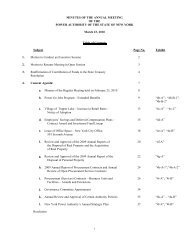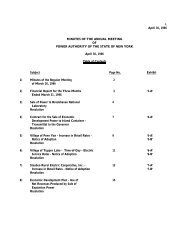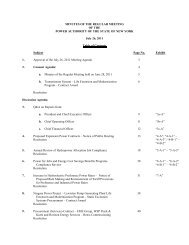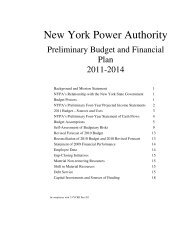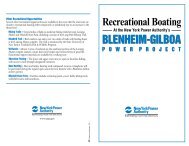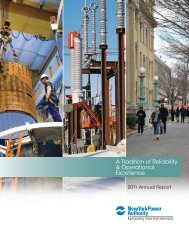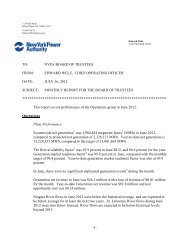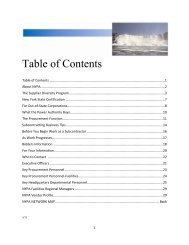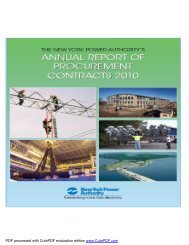- Page 1 and 2:
MINUTES OF THE ANNUAL MEETING OF TH
- Page 3 and 4:
April 24, 2007 Minutes of the Annua
- Page 5 and 6:
April 24, 2007 1. Approval of the M
- Page 20 and 21: April 24, 2007 3. Report from the P
- Page 22 and 23: April 24, 2007 The following resolu
- Page 24 and 25: Exhibit “4-A1” April 24, 2007 A
- Page 26 and 27: April 24, 2007 5. Power for Jobs Pr
- Page 28 and 29: April 24, 2007 NOW THEREFORE BE IT
- Page 30 and 31: April 24, 2007 6. Municipal and Rur
- Page 32 and 33: April 24, 2007 7. Annual Review of
- Page 34 and 35: April 24, 2007 i.e., 55.16% and 59.
- Page 36 and 37: April 24, 2007 Granny’s Kitchens,
- Page 38 and 39: April 24, 2007 Background: Norampac
- Page 40 and 41: April 24, 2007 Allocation: 350 kW o
- Page 42 and 43: April 24, 2007 Exhibit “7-A” I.
- Page 44 and 45: April 24, 2007 8. Increase in Hydro
- Page 46 and 47: April 24, 2007 analyses and rate ap
- Page 48 and 49: April 24, 2007 “It is also recomm
- Page 50: New York Power Authority Staff Anal
- Page 53 and 54: Staff Analysis:....................
- Page 55 and 56: cooperatives, as well as the bargai
- Page 57 and 58: Subsequent to the Trustees’ actio
- Page 59 and 60: Rate Year Demand Rate $/kW-month En
- Page 61 and 62: Staff Analysis: As explained in det
- Page 63 and 64: (with a decrease in nighttime produ
- Page 65 and 66: electromechanical equipment being s
- Page 67 and 68: Recommendation: The Niagara Project
- Page 69: Staff Analysis: 1. The Authority’
- Page 73 and 74: C. Issue: Inflation Compensation Ad
- Page 75 and 76: Recommendation: Staff does not reco
- Page 77 and 78: F. Issue: Request for CoS Credit fo
- Page 79 and 80: principles as well as the basis use
- Page 81 and 82: I. Issue: Inclusion of Research & D
- Page 83 and 84: K. Issue: Request to Defer Final Ac
- Page 85 and 86: NEW YORK POWER AUTHORITY HYDROELECT
- Page 87 and 88: Exhibit B NEW YORK POWER AUTHORITY
- Page 89 and 90: Exhibit D NEW YORK POWER AUTHORITY
- Page 91 and 92: Table 1 EMBEDDED COSTS FOR ANCILLAR
- Page 93 and 94: Table 3 EMBEDDED COSTS FOR BLACK ST
- Page 95 and 96: Table 5 EMBEDDED COSTS FOR OPERATIN
- Page 97 and 98: Table of Contents Page Executive Su
- Page 99 and 100: Discussion The attached preliminary
- Page 101 and 102: (OPRHP). The October 23, 2003 FERC
- Page 103 and 104: The costs of a new license and the
- Page 105 and 106: the plan, May 1, 2006 to April 30,
- Page 107: NEW YORK POWER AUTHORITY ESTIMATED
- Page 299 and 300:
April 24, 2007 “It is difficult t
- Page 301 and 302:
April 24, 2007 10. 2006 Annual Repo
- Page 303 and 304:
April 24, 2007 Attachment I 2006 M/
- Page 305 and 306:
April 24, 2007 Attachment III 2006
- Page 307 and 308:
April 24, 2007 Exhibit “A-1” PO
- Page 309 and 310:
April 24, 2007 11. REPORTING REQUIR
- Page 311 and 312:
April 24, 2007 Exhibit “A-2” GU
- Page 313 and 314:
April 24, 2007 D.G. E.H. F.I. The A
- Page 315 and 316:
April 24, 2007 had, in the immediat
- Page 317 and 318:
April 24, 2007 O.R. Pursuant to Sta
- Page 319 and 320:
April 24, 2007 E. For Procurement C
- Page 321 and 322:
April 24, 2007 well as the original
- Page 323 and 324:
April 24, 2007 9. Warranty 10. Insu
- Page 325 and 326:
April 24, 2007 any case, proceeding
- Page 327 and 328:
April 24, 2007 required by law. Cop
- Page 329 and 330:
TABLES FOR PROCUREMENT CONTRACT SUM
- Page 331 and 332:
FACILITY: WPO POWER AUTHORITY OF TH
- Page 333 and 334:
FACILITY: WPO POWER AUTHORITY OF TH
- Page 335 and 336:
FACILITY: WPO POWER AUTHORITY OF TH
- Page 337 and 338:
FACILITY: WPO POWER AUTHORITY OF TH
- Page 339 and 340:
FACILITY: WPO POWER AUTHORITY OF TH
- Page 341 and 342:
FACILITY: WPO POWER AUTHORITY OF TH
- Page 343 and 344:
FACILITY: WPO POWER AUTHORITY OF TH
- Page 345 and 346:
FACILITY: WPO POWER AUTHORITY OF TH
- Page 347 and 348:
FACILITY: WPO POWER AUTHORITY OF TH
- Page 349 and 350:
FACILITY: WPO POWER AUTHORITY OF TH
- Page 351 and 352:
FACILITY: WPO POWER AUTHORITY OF TH
- Page 353 and 354:
FACILITY: WPO POWER AUTHORITY OF TH
- Page 355 and 356:
FACILITY: WPO POWER AUTHORITY OF TH
- Page 357 and 358:
FACILITY: WPO POWER AUTHORITY OF TH
- Page 359 and 360:
FACILITY: WPO POWER AUTHORITY OF TH
- Page 361 and 362:
FACILITY: WPO POWER AUTHORITY OF TH
- Page 363 and 364:
FACILITY: WPO POWER AUTHORITY OF TH
- Page 365 and 366:
FACILITY: WPO POWER AUTHORITY OF TH
- Page 367 and 368:
FACILITY: WPO POWER AUTHORITY OF TH
- Page 369 and 370:
FACILITY: WPO POWER AUTHORITY OF TH
- Page 371 and 372:
FACILITY: WPO POWER AUTHORITY OF TH
- Page 373 and 374:
FACILITY: WPO POWER AUTHORITY OF TH
- Page 375 and 376:
FACILITY: WPO POWER AUTHORITY OF TH
- Page 377 and 378:
FACILITY: WPO POWER AUTHORITY OF TH
- Page 379 and 380:
FACILITY: WPO POWER AUTHORITY OF TH
- Page 381 and 382:
FACILITY: WPO POWER AUTHORITY OF TH
- Page 383 and 384:
FACILITY: WPO POWER AUTHORITY OF TH
- Page 385 and 386:
FACILITY: WPO POWER AUTHORITY OF TH
- Page 387 and 388:
FACILITY: WPO POWER AUTHORITY OF TH
- Page 389 and 390:
FACILITY: WPO POWER AUTHORITY OF TH
- Page 391 and 392:
FACILITY: WPO POWER AUTHORITY OF TH
- Page 393 and 394:
FACILITY: WPO POWER AUTHORITY OF TH
- Page 395 and 396:
FACILITY: WPO POWER AUTHORITY OF TH
- Page 397 and 398:
FACILITY: WPO POWER AUTHORITY OF TH
- Page 399 and 400:
FACILITY: WPO POWER AUTHORITY OF TH
- Page 401 and 402:
FACILITY: WPO POWER AUTHORITY OF TH
- Page 403 and 404:
FACILITY: WPO POWER AUTHORITY OF TH
- Page 405 and 406:
FACILITY: WPO POWER AUTHORITY OF TH
- Page 407 and 408:
FACILITY: WPO POWER AUTHORITY OF TH
- Page 409 and 410:
FACILITY: WPO POWER AUTHORITY OF TH
- Page 411 and 412:
FACILITY: WPO POWER AUTHORITY OF TH
- Page 413 and 414:
FACILITY: WPO POWER AUTHORITY OF TH
- Page 415 and 416:
FACILITY: WPO POWER AUTHORITY OF TH
- Page 417 and 418:
FACILITY: WPO POWER AUTHORITY OF TH
- Page 419 and 420:
FACILITY: WPO POWER AUTHORITY OF TH
- Page 421 and 422:
FACILITY: WPO POWER AUTHORITY OF TH
- Page 423 and 424:
FACILITY: WPO POWER AUTHORITY OF TH
- Page 425 and 426:
FACILITY: WPO POWER AUTHORITY OF TH
- Page 427 and 428:
FACILITY: WPO POWER AUTHORITY OF TH
- Page 429 and 430:
FACILITY: WPO POWER AUTHORITY OF TH
- Page 431 and 432:
FACILITY: WPO POWER AUTHORITY OF TH
- Page 433 and 434:
FACILITY: WPO POWER AUTHORITY OF TH
- Page 435 and 436:
FACILITY: WPO POWER AUTHORITY OF TH
- Page 437 and 438:
FACILITY: WPO POWER AUTHORITY OF TH
- Page 439 and 440:
FACILITY: WPO POWER AUTHORITY OF TH
- Page 441 and 442:
FACILITY: WPO POWER AUTHORITY OF TH
- Page 443 and 444:
FACILITY: WPO POWER AUTHORITY OF TH
- Page 445 and 446:
FACILITY: WPO POWER AUTHORITY OF TH
- Page 447 and 448:
FACILITY: WPO POWER AUTHORITY OF TH
- Page 449 and 450:
FACILITY: WPO POWER AUTHORITY OF TH
- Page 451 and 452:
FACILITY: WPO POWER AUTHORITY OF TH
- Page 453 and 454:
FACILITY: WPO POWER AUTHORITY OF TH
- Page 455 and 456:
FACILITY: WPO POWER AUTHORITY OF TH
- Page 457 and 458:
FACILITY: WPO POWER AUTHORITY OF TH
- Page 459 and 460:
FACILITY: WPO POWER AUTHORITY OF TH
- Page 461 and 462:
FACILITY: WPO POWER AUTHORITY OF TH
- Page 463 and 464:
FACILITY: WPO POWER AUTHORITY OF TH
- Page 465 and 466:
FACILITY: WPO POWER AUTHORITY OF TH
- Page 467 and 468:
FACILITY: WPO POWER AUTHORITY OF TH
- Page 469 and 470:
FACILITY: WPO POWER AUTHORITY OF TH
- Page 471 and 472:
FACILITY: WPO POWER AUTHORITY OF TH
- Page 473 and 474:
FACILITY: WPO POWER AUTHORITY OF TH
- Page 475 and 476:
FACILITY: WPO POWER AUTHORITY OF TH
- Page 477 and 478:
FACILITY: BG POWER AUTHORITY OF THE
- Page 479 and 480:
FACILITY: BG POWER AUTHORITY OF THE
- Page 481 and 482:
FACILITY: BG POWER AUTHORITY OF THE
- Page 483 and 484:
FACILITY: BG POWER AUTHORITY OF THE
- Page 485 and 486:
FACILITY: BG POWER AUTHORITY OF THE
- Page 487 and 488:
FACILITY: BG POWER AUTHORITY OF THE
- Page 489 and 490:
FACILITY: BG POWER AUTHORITY OF THE
- Page 491 and 492:
FACILITY: BG POWER AUTHORITY OF THE
- Page 493 and 494:
FACILITY: CEC POWER AUTHORITY OF TH
- Page 495 and 496:
FACILITY: CEC POWER AUTHORITY OF TH
- Page 497 and 498:
FACILITY: CEC POWER AUTHORITY OF TH
- Page 499 and 500:
FACILITY: CEC POWER AUTHORITY OF TH
- Page 501 and 502:
FACILITY: CEC POWER AUTHORITY OF TH
- Page 503 and 504:
FACILITY: CEC POWER AUTHORITY OF TH
- Page 505 and 506:
FACILITY: CEC POWER AUTHORITY OF TH
- Page 507 and 508:
FACILITY: CEC POWER AUTHORITY OF TH
- Page 509 and 510:
FACILITY: NIAGARA POWER AUTHORITY O
- Page 511 and 512:
FACILITY: NIAGARA POWER AUTHORITY O
- Page 513 and 514:
FACILITY: NIAGARA POWER AUTHORITY O
- Page 515 and 516:
FACILITY: NIAGARA POWER AUTHORITY O
- Page 517 and 518:
FACILITY: NIAGARA POWER AUTHORITY O
- Page 519 and 520:
FACILITY: NIAGARA POWER AUTHORITY O
- Page 521 and 522:
FACILITY: NIAGARA POWER AUTHORITY O
- Page 523 and 524:
FACILITY: NIAGARA POWER AUTHORITY O
- Page 525 and 526:
FACILITY: NIAGARA POWER AUTHORITY O
- Page 527 and 528:
FACILITY: NIAGARA POWER AUTHORITY O
- Page 529 and 530:
FACILITY: NIAGARA POWER AUTHORITY O
- Page 531 and 532:
FACILITY: NIAGARA POWER AUTHORITY O
- Page 533 and 534:
FACILITY: NIAGARA POWER AUTHORITY O
- Page 535 and 536:
FACILITY: NIAGARA POWER AUTHORITY O
- Page 537 and 538:
FACILITY: NIAGARA POWER AUTHORITY O
- Page 539 and 540:
FACILITY: NIAGARA POWER AUTHORITY O
- Page 541 and 542:
FACILITIES: POLETTI-FLYNN-500MW POW
- Page 543 and 544:
FACILITIES: POLETTI-FLYNN-500MW POW
- Page 545 and 546:
FACILITIES: POLETTI-FLYNN-500MW POW
- Page 547 and 548:
FACILITIES: POLETTI-FLYNN-500MW POW
- Page 549 and 550:
FACILITIES: POLETTI-FLYNN-500MW POW
- Page 551 and 552:
FACILITIES: POLETTI-FLYNN-500MW POW
- Page 553 and 554:
FACILITIES: POLETTI-FLYNN-500MW POW
- Page 555 and 556:
FACILITIES: POLETTI-FLYNN-500MW POW
- Page 557 and 558:
FACILITIES: POLETTI-FLYNN-500MW POW
- Page 559 and 560:
FACILITIES: POLETTI-FLYNN-500MW POW
- Page 561 and 562:
FACILITIES: POLETTI-FLYNN-500MW POW
- Page 563 and 564:
FACILITIES: POLETTI-FLYNN-500MW POW
- Page 565 and 566:
FACILITIES: POLETTI-FLYNN-500MW POW
- Page 567 and 568:
FACILITIES: POLETTI-FLYNN-500MW POW
- Page 569 and 570:
FACILITIES: POLETTI-FLYNN-500MW POW
- Page 571 and 572:
FACILITIES: POLETTI-FLYNN-500MW POW
- Page 573 and 574:
FACILITIES: POLETTI-FLYNN-500MW POW
- Page 575 and 576:
FACILITIES: POLETTI-FLYNN-500MW POW
- Page 577 and 578:
FACILITIES: POLETTI-FLYNN-500MW POW
- Page 579 and 580:
FACILITIES: POLETTI-FLYNN-500MW POW
- Page 581 and 582:
FACILITIES: POLETTI-FLYNN-500MW POW
- Page 583 and 584:
FACILITIES: POLETTI-FLYNN-500MW POW
- Page 585 and 586:
FACILITIES: POLETTI-FLYNN-500MW POW
- Page 587 and 588:
FACILITIES: POLETTI-FLYNN-500MW POW
- Page 589 and 590:
FACILITIES: POLETTI-FLYNN-500MW POW
- Page 591 and 592:
FACILITIES: POLETTI-FLYNN-500MW POW
- Page 593 and 594:
FACILITIES: POLETTI-FLYNN-500MW POW
- Page 595 and 596:
FACILITIES: POLETTI-FLYNN-500MW POW
- Page 597 and 598:
FACILITIES: POLETTI-FLYNN-500MW POW
- Page 599 and 600:
FACILITIES: POLETTI-FLYNN-500MW POW
- Page 601 and 602:
FACILITIES: POLETTI-FLYNN-500MW POW
- Page 603 and 604:
FACILITIES: POLETTI-FLYNN-500MW POW
- Page 605 and 606:
FACILITIES: POLETTI-FLYNN-500MW POW
- Page 607 and 608:
FACILITIES: POLETTI-FLYNN-500MW POW
- Page 609 and 610:
FACILITY: ST LAWRENCE POWER AUTHORI
- Page 611 and 612:
FACILITY: ST LAWRENCE POWER AUTHORI
- Page 613 and 614:
FACILITY: ST LAWRENCE POWER AUTHORI
- Page 615 and 616:
FACILITY: ST LAWRENCE POWER AUTHORI
- Page 617 and 618:
FACILITY: ST LAWRENCE POWER AUTHORI
- Page 619 and 620:
FACILITY: ST LAWRENCE POWER AUTHORI
- Page 621 and 622:
FACILITY: ST LAWRENCE POWER AUTHORI
- Page 623 and 624:
FACILITY: ST LAWRENCE POWER AUTHORI
- Page 625 and 626:
FACILITY: ST LAWRENCE POWER AUTHORI
- Page 627 and 628:
FACILITY: ST LAWRENCE POWER AUTHORI
- Page 629 and 630:
SITE TOTALS POWER AUTHORITY OF THE
- Page 631 and 632:
CORPORATE FINANCE: WPO POWER AUTHOR
- Page 633 and 634:
FACILITY: WPO FOSSIL FUELS POWER AU
- Page 635 and 636:
FACILITY: WPO FOSSIL FUELS POWER AU
- Page 637 and 638:
FACILITY: WPO FOSSIL FUELS POWER AU
- Page 639 and 640:
FACILITY: WPO FOSSIL FUELS POWER AU
- Page 641 and 642:
FACILITY: WPO FOSSIL FUELS POWER AU
- Page 643 and 644:
FACILITY: WPO FOSSIL FUELS POWER AU
- Page 645 and 646:
FACILITY: WPO FOSSEL FUELS POWER AU
- Page 647 and 648:
April 24, 2007 “The balance of th
- Page 649 and 650:
April, 24, 2007 Exhibit “11-B”
- Page 651 and 652:
April 24, 2007 units, achieving pea
- Page 653 and 654:
April 24, 2007 13. Richard M. Flynn
- Page 655 and 656:
April 24, 2007 AND BE IT FURTHER RE
- Page 657 and 658:
April 24, 2007 15. Motion to Resume
- Page 659 and 660:
April 24, 2007 Timothy S. Carey - P
- Page 661 and 662:
April 24, 2007 (iii) Modify Section
- Page 663 and 664:
April 24, 2007 Exhibit “17-A” G
- Page 665 and 666:
April 24, 2007 GUIDELINES AND PROCE
- Page 667 and 668:
April 24, 2007 IV. TRANSACTIONS NOT
- Page 669 and 670:
April 24, 2007 Attachment “A” i
- Page 671 and 672:
April 24, 2007 b. bid prices after
- Page 673 and 674:
April 24, 2007 2. Consolidation of
- Page 675 and 676:
April 24, 2007 Property. B. If the
- Page 677 and 678:
April 24, 2007 1.Any violation of t
- Page 679 and 680:
April 24, 2007 B. Return to the Ori
- Page 681 and 682:
April 24, 2007 Guidelines most rece
- Page 683 and 684:
April 24, 2007 Attachment A Page 2
- Page 685 and 686:
April 24, 2007 Attachment C Page 1
- Page 687 and 688:
April 24, 2007 Exhibit “17-B” G
- Page 689 and 690:
April 24, 2007 GUIDELINES AND PROCE
- Page 691 and 692:
April 24, 2007 disposal or contract
- Page 693 and 694:
April 24, 2007 refusal to answer an
- Page 695 and 696:
April 24, 2007 18. Next Meeting The



